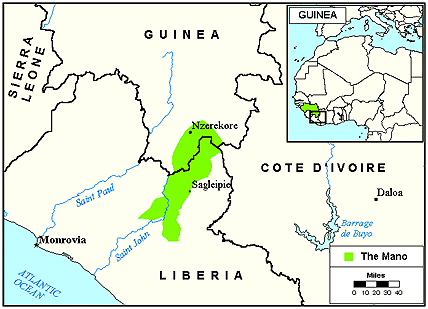|
|
Prayer Profile
The Mano of Guinea
![[IMAGE]](../images5/0883.jpg) The Mano live primarily in southern Guinea and northern Liberia. The Mano in Guinea speak a language (also called Mano) that is strongly influenced by the Mandingo language. Mano has many dialects and belongs to the Eastern branch of the Mande languages. The Mano strongly identify themselves with the Kono and Gio tribes. The Gio are regarded as the "small brothers" of the Mano, and their languages are closely related.
The Mano live primarily in southern Guinea and northern Liberia. The Mano in Guinea speak a language (also called Mano) that is strongly influenced by the Mandingo language. Mano has many dialects and belongs to the Eastern branch of the Mande languages. The Mano strongly identify themselves with the Kono and Gio tribes. The Gio are regarded as the "small brothers" of the Mano, and their languages are closely related.
Between the seventeenth and eighteenth centuries, many Mande-speaking peoples (including the Gio, the Mano, and the Kono) migrated from the North. The Mandingo forced the Kpelle to move southward. They, in turn, forced the Mande-speakers farther southward. Most of the Mano settled in Guinea. However, many immigrated to Liberia at the end of the 1800's when the French occupied Guinea. Although many Mano still live in Liberia today, about 40,000 remain in southern Guinea.
What are their lives like?
The Mano are provided with the bare necessities of life through farming. Rice is the staple crop and it is grown on large cultivated lands outside the village. Temporary huts are a resting place for many during harvest time. Once the rice is planted, sacrifices and medicines are made to ensure a good harvest.
Hand-made fences surround the farmland in an attempt to discourage threatening animals. Boys chase birds away or hunt them before they can kill the crops. The women are primarily responsible for weeding the fields. Pineapple, peppers, beans, okra, onion, maize, and bananas are among the crops grown in the farm villages. Coffee and peanuts are grown as cash crops. Each year, a new farm site must be selected. Then, the bush undergrowth and trees must be cut and burned.
Cattle, goats, chickens, and other animals are found in all Mano towns. Cows are not milked and only chickens—never eggs—are eaten on a regular basis. The Mano are excellent hunters. However, animals in the forests are becoming extinct, partly because of the introduction of firearms in the area.
Both men and women fish using nets, basket-traps, and lines. Frozen fish is also bought in the markets. Consequently, the Mano eat fish a great deal and very little meat. Wild mushrooms are usually eaten with fish and constitute an important part of the diet. The Mano believe that rice must be eaten at every meal for that meal to be considered complete. Ants, grasshoppers, and caterpillars are also toasted and eaten as snacks.
Although some Mano must sleep in the small, temporary farm villages during harvest season, most Mano live in towns year-round. These towns are located on high ground with water sources nearby. They are crowded, with communities ranging from as few as ten to as many as several hundred, and the houses are close together. The most common Mano houses are those built on clay platforms to keep out the rain. They are square homes with low-walled porches and thatched roofs.
What are their beliefs?
Ninety percent of the Mano of Guinea are animists (believe that non-human objects have spirits). Wala is believed to be the creator god who lives in heaven. However, the Mano have little idea of what heaven or life after death is really like.
The Mano believe that small men or goblins live in the bush. The goblins are thought to be ghosts who have friendly relationships with people. However, the Mano believe that goblins may kill anyone who destroys their homes by clearing the land.
Witchcraft also plays an important role in Mano beliefs. Witches often curse and sometimes kill their victims.
What are their needs?
Three missions agencies are currently targeting the Mano of Guinea. Only parts of the New Testament have been translated into Mano. Additional evangelistic tools, Christian workers, and continued prayer are needed to see these precious people turn to Christ.
Prayer Points
- Ask the Holy Spirit to grant wisdom and favor to the three missions agencies that are currently targeting the Mano.
- Pray that Christian radio and television broadcasts will soon be made available in the Mano language.
- Ask the Lord Jesus to reveal Himself to the Mano through dreams and visions.
- Pray that the Lord will give the Mano believers boldness to share Christ with their own people.
- Take authority over the spiritual principalities and powers that are keeping the Mano bound.
- Ask God to raise up prayer teams who will break up the soil through worship and intercession.
- Pray that God will call Christian teachers and medical teams to go to Guinea and work among the Mano.
- Ask the Lord to bring forth a triumphant Mano church.

Statistics
Latest estimates from the World Evangelization Research Center.
THE PEOPLE
- People name: Mano
- Country: Guinea
- Their language: Mano
- Population:
- Largest religion:
- Christian: 1.5%
- Church members: 579
- Scriptures in their own language: New Testament
- Jesus Film in their own language: None
- Christian broadcasts in their own language: None
- Mission agencies working among this people: 3
- Persons who have heard the Gospel: 11,000 (29%)
- Persons who have never heard the Gospel: 27,600 (71%)
THEIR COUNTRY
- Country: Guinea
- Population:
- Major peoples in size order:
- Major religions:
- Number of denominations: 10
© Copyright 1997
Bethany World Prayer Center
This profile may be copied and distributed without obtaining permission
as long as it is not altered, bound, published
or used for profit purposes.
![[HOME BUTTON]](../graphics/home.jpg)
![[CALENDAR BUTTON]](../graphics/calico.jpg)
![[LIST BUTTON]](../graphics/listico.jpg)
[Home]
[Calendar]
[Country List]
|